
npj Science of Food
Scope & Guideline
Innovating Solutions for Sustainable Food Systems
Introduction
Aims and Scopes
- Food Safety and Quality:
Research that explores methods to enhance food safety, detect contaminants, and ensure quality in food products. This includes studies on microbial safety, food fraud, and the impact of processing methods on food integrity. - Nutrition and Health:
Investigations into the nutritional aspects of food, including how different foods affect health outcomes, metabolic processes, and chronic disease management. This area also encompasses personalized nutrition and the role of dietary components in health. - Sustainable Food Systems:
Research aimed at developing sustainable practices in food production, waste management, and resource utilization. This includes studies on the circular economy in food systems and sustainable agricultural practices. - Food Technology and Innovation:
Innovative approaches to food processing, packaging, and preservation, including the use of new technologies like 3D printing and bioengineering in food production. - Functional Foods and Bioactive Compounds:
Studies on the health benefits of specific food components, such as probiotics, prebiotics, and phytochemicals, and their mechanisms of action in the human body. - Food Chemistry and Bioprocessing:
Research focused on the chemical properties of food and the biochemical processes involved in food production, including fermentation, enzymatic reactions, and the development of novel food ingredients.
Trending and Emerging
- Plant-Based and Alternative Proteins:
There is a significant increase in research focused on plant-based proteins and alternative protein sources, including insects and cell-cultured meat. This trend is driven by consumer demand for sustainable and health-conscious food options. - Gut Microbiome and Health:
Research exploring the relationship between food, the gut microbiome, and health outcomes is gaining traction. This includes studies on probiotics, prebiotics, and dietary interventions that modulate gut microbiota for better health. - Food Waste Reduction and Circular Economy:
A growing emphasis on strategies to minimize food waste and promote a circular economy in food systems. This includes innovative approaches to utilize by-products and enhance sustainability in food production. - Food Technology Advancements:
Emerging technologies in food processing, such as 3D printing, nanotechnology, and bioprocessing, are becoming increasingly prominent. Research is focusing on how these technologies can transform food manufacturing and enhance food safety. - Functional Foods and Nutraceuticals:
There is a rising interest in the health benefits of functional foods and nutraceuticals, with research aimed at identifying bioactive compounds and their effects on chronic diseases and overall health. - Precision Nutrition and Personalized Diets:
An increasing focus on precision nutrition, which tailors dietary recommendations to individual health needs and genetic profiles, is emerging. This reflects a broader trend towards personalized health solutions.
Declining or Waning
- Traditional Food Processing Techniques:
Research focusing on conventional methods of food processing appears to be declining as newer technologies and methods gain traction. The emphasis is shifting towards innovative processing techniques that enhance food safety and nutritional value. - Animal-Based Food Products:
The focus on traditional animal-based products and their production methods is waning, likely due to the increasing interest in plant-based alternatives and sustainability concerns surrounding animal agriculture. - Basic Food Composition Studies:
While foundational research is important, there has been a noticeable reduction in studies solely focused on the basic composition of foods without addressing health implications or technological applications. - Single-Ingredient Studies:
Research that examines isolated ingredients without considering their interactions in complex food systems is becoming less common, as there is a greater emphasis on holistic approaches to food science.
Similar Journals
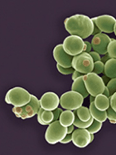
Annual Review of Food Science and Technology
Unveiling Cutting-Edge Insights in Food ResearchThe Annual Review of Food Science and Technology, published by ANNUAL REVIEWS, is an esteemed journal dedicated to advancing the knowledge within the field of food science. With an impressive Q1 ranking in the Food Science category, and ranking as #6 out of 389 in the Scopus Agricultural and Biological Sciences category, the journal serves as a vital resource for researchers, professionals, and students. This publication encapsulates comprehensive reviews and cutting-edge research, helping to bridge the gap between research and practical application. Though it does not offer Open Access, it provides valuable insights into various aspects of food science from 2010 to 2024, ensuring that its readership stays at the forefront of emerging trends and innovations. The journal's focus on high-quality, peer-reviewed articles makes it a critical platform for scholars looking to deepen their understanding and contribute to this rapidly evolving field.

Journal of Future Foods
Connecting researchers to shape the future of food.Welcome to the Journal of Future Foods, a prominent peer-reviewed publication dedicated to advancing knowledge and innovation within the realms of Agricultural and Biological Sciences, Food Science, and Nutrition and Dietetics. Published by KEAI PUBLISHING LTD in China, this journal has rapidly achieved a distinguished reputation, reflected in its impressive Q1 category ranking for both Agricultural and Biological Sciences and Food Science, along with a strong standing in Nutrition and Dietetics. The journal, which spans the period from 2021 to 2025, is committed to fostering interdisciplinary research that addresses the challenges and opportunities presented by the future of food. With a focus on open access, the Journal of Future Foods aims to disseminate crucial findings and foster collaborative dialogue among researchers, professionals, and students alike. By submitting your work, you not only contribute to cutting-edge advancements in the field but also join a vibrant community engaged in redefining the future of food systems.

eFood
Exploring the future of food innovation and safety.eFood is a pioneering journal in the field of food science, published by the esteemed WILEY. With its impactful emergence, the journal has rapidly established itself within the academic community, evidenced by its impressive Q1 category ranking in Food Science as of 2023, and a commendable position at Rank #95 out of 389 in the Scopus database. Covering a wide spectrum of topics related to food innovation, technology, safety, and nutrition, eFood serves as an indispensable platform for researchers, industry professionals, and students who are at the forefront of advancing our understanding of food systems. The journal notably operates with an open-access model, promoting wide dissemination of knowledge while enhancing the visibility of high-quality research. As we look forward to converging years from 2020 to 2024, eFood is poised to foster rigorous scientific discourse and contribute significantly to the future of food science research.

FOOD TECHNOLOGY AND BIOTECHNOLOGY
Unlocking the Potential of Food Science and BiotechnologyFOOD TECHNOLOGY AND BIOTECHNOLOGY is a distinguished peer-reviewed journal published by the Faculty of Food Technology and Biotechnology, University of Zagreb, Croatia. Since its inception in 1993, this Open Access journal has become a crucial platform for disseminating innovative research in the fields of food science, biotechnology, and chemical engineering. With a commendable impact factor and consistent Q2 and Q3 rankings across multiple categories—including Biotechnology, Food Science, and Industrial Engineering—this journal not only fosters academic discussions but also addresses real-world challenges in food production, safety, and sustainability. As it converges its thematic scope from 1996 to 2024, FOOD TECHNOLOGY AND BIOTECHNOLOGY remains committed to advancing knowledge through high-quality research and interdisciplinary collaboration, making it an essential resource for researchers, professionals, and students seeking to stay at the forefront of food innovation and biotechnology.
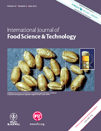
INTERNATIONAL JOURNAL OF FOOD SCIENCE AND TECHNOLOGY
Elevating Standards in Food Science ExcellenceINTERNATIONAL JOURNAL OF FOOD SCIENCE AND TECHNOLOGY, published by WILEY, serves as a premier platform for the dissemination of cutting-edge research in the field of food science and technology. With an ISSN of 0950-5423 and E-ISSN 1365-2621, this journal has been committed to publishing high-quality research since 1966 and is set to continue its impactful contributions through 2024. Recognized for its excellence, it holds a Q1 ranking in Food Science and a Q2 ranking in Industrial and Manufacturing Engineering as of 2023. The journal ranks #95/384 in Industrial and Manufacturing Engineering and #100/389 in Food Science on Scopus, placing it within the top quartiles of these fields. Although it does not currently offer Open Access, researchers and professionals benefit from access to a wealth of knowledge that advances understanding in both applied and theoretical aspects of food science. This journal is indispensable for anyone in the academic and professional domains who seeks to stay abreast of innovations and trends shaping the food industry.

Future Foods
Innovating tomorrow's food solutions today.Welcome to Future Foods, a cutting-edge academic journal published by Elsevier, dedicated to advancing the field of food science. As a prestigious Q1 journal in the Food Science category, it ranks impressively as #43 out of 389 in Scopus, placing it in the 89th percentile among its peers. Future Foods aims to explore innovative developments in sustainable food systems, novel food products, and the intersection of technology and food production, thus providing a platform for research that addresses global challenges such as food security and nutrition. With its focus on future-oriented solutions and trends in the food industry, this journal is essential for researchers, professionals, and students who are eager to contribute to the discourse around cutting-edge food science. Situated in the Netherlands, the journal serves the international academic community and fosters collaboration and knowledge sharing in the realm of food innovation.
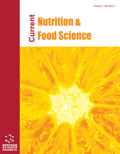
Current Nutrition & Food Science
Fostering excellence in food science and nutritional studies.Current Nutrition & Food Science is a prominent journal in the fields of Food Science, Nutrition, and Dietetics, published by Bentham Science Publishers Ltd. Based in the United Arab Emirates, the journal has been a significant resource since its inception in 2006, and is expected to continue contributing valuable insights through 2024. With an impressive impact factor and a comprehensive scope that examines the intersection of nutrition, food science, and public health, it operates within Category Quartiles reflecting its standing, with rankings in Q3 for Food Science and Nutrition, and Q4 for Public Health. Despite its challenges in visibility as indicated by current Scopus rankings, the journal remains a critical platform for ongoing research and discussions in the realm of nutritional science. Researchers, professionals, and students alike will find that the journal's commitment to quality and relevance makes it an essential tool for advancing understanding and innovation in nutrition and food science.
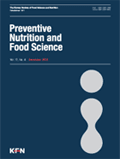
Preventive Nutrition and Food Science
Illuminating Research at the Forefront of Food Science and NutritionPreventive Nutrition and Food Science, an esteemed journal published by the Korean Society of Food Science and Nutrition, serves as a pivotal platform for the dissemination of innovative research and insights in the fields of food science, nutrition, and dietetics. With an ISSN of 2287-1098 and an E-ISSN of 2287-8602, this journal is dedicated to advancing knowledge from 2012 through 2024, showcasing contributions that reflect the interplay between nutrition, health, and preventive strategies. Indexed in Scopus, it proudly holds a Q2 ranking in Food Science and a Q3 ranking in Nutrition and Dietetics as of 2023, positioning it among influential publications within these disciplines. Researchers, professionals, and students can explore cutting-edge studies that contribute significantly to evidence-based practices, enhancing public health and nutritional care. Although it operates under a subscription model, the journal plays a crucial role in fostering a deeper understanding of preventive nutrition, advocating for advancements that address contemporary dietary challenges.
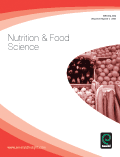
Nutrition & Food Science
Cultivating a deeper understanding of nutrition and food systems.Nutrition & Food Science, published by EMERALD GROUP PUBLISHING LTD, is a prominent journal dedicated to advancing the understanding of nutritional science and food technology. With an ISSN of 0034-6659 and an E-ISSN of 1758-6917, this journal has provided a platform for scholarly articles, reviews, and insightful research since its inception in 1971. The journal is recognized in the Q3 quartile for both Food Science and Nutrition and Dietetics categories, showcasing its moderate impact within the field. Currently ranked #202 in Food Science and #81 in Nutrition and Dietetics based on Scopus metrics, it caters to a diverse audience of researchers, practitioners, and students eager to explore the latest findings and developments. While not an open-access journal, it offers various subscription options for individuals and institutions keen on accessing high-quality research. With a commitment to interdisciplinary collaboration and practical applications, Nutrition & Food Science is an essential resource for those invested in improving health outcomes through informed dietary practices and food innovations.

Food Science and Human Wellness
Exploring Innovations in Food and HealthFood Science and Human Wellness, published by TSINGHUA UNIVERSITY PRESS, is an esteemed open-access journal that has been at the forefront of advancing research in the interdisciplinary fields of food science and human health since its inception in 2012. With an impressive impact factor indicative of its quality and relevance, this journal holds a prestigious Q1 ranking in Food Science according to 2023 metrics, reflecting its commitment to high-caliber research and innovation. The journal is positioned within the top 12% of its category, ranked 46th out of 389 in Agricultural and Biological Sciences. The journal not only publishes original research articles but also critical reviews, perspectives, and innovations that contribute significantly to our understanding of the relationship between nutrition, wellness, and food science. With its Open Access model, Food Science and Human Wellness ensures that its valuable content is available to a global audience, fostering collaborative advancements in this vital field. Researchers, professionals, and students are invited to explore insightful discussions and impactful studies that aim to enhance public health and food safety.